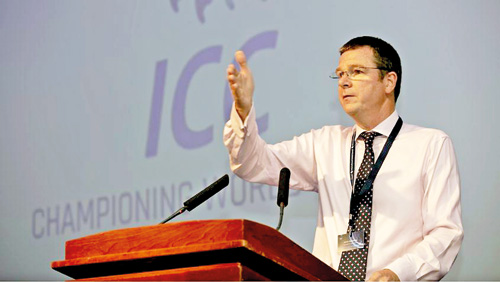More Sri Lankans in charge-list

Alex Marshall, the General Manager of ICC's Anti-Corruption Unit has more news for Sri Lanka cricket followers
More Sri Lankans will be charged under the International Cricket Council’s (ICC) Anti-Corruption Code as the watchdog body edges closer to completing their months-long investigations into match fixing in Sri Lanka, a senior official told the Sunday Times.
Sri Lanka cricket has been under investigation since 2017 after several former players questioned the manner in which the team conceded an ODI series to Zimbabwe at home (3-2).
“Our investigations are ongoing and more people are likely to be charged in the coming months,” said Alex Marshall, General Manager of ICC’s Anti-Corruption Unit.
“It will take at least three months to complete the investigations.”
The ICC has charged three players so far but expects to charge several more after new evidence was gathered during a 15-day Amnesty which ended on January 31 this year. Former Sri Lanka skipper Sanath Jayasuriya was recently issued a two-year ban from cricket after he admitted to not cooperating with investigations — an offence under ICC’s Anti-Corruption Code. Even though their charges are not corruption-related, former cricketers Nuwan Zoysa and Dilhara Lokuhettige have also been charged and are awaiting trial.
Zoysa, a former coach attached to Sri Lanka Cricket (SLC), and former international cricketer Lokuhettige were accused of “directly soliciting, inducing, enticing or encouraging a player” to fix or influence the progress of a match and failing to disclose approaches to “engage in corrupt conduct”. Zoysa has publicly denied any wrongdoing and has decided to contest the charges. Lokuhettige has maintained silence.
Jayasuriya’s suspension came four weeks after the ICC completed a 15-day amnesty that resulted in 11 players and other participants coming forward with new information. This, the ICC says, has assisted a number of ongoing inquiries and resulted in some new ones also getting underway.
Despite the ICC’s probe into what they termed as “serious allegations of corruption” with links to the underworld, Sports Minister Harin Fernando recently insisted that none of the current players are under investigation. It is a statement Marshall, when asked, neither refuted nor accepted.
“We cannot divulge details of our investigations at this point in time,” he said.
“With the World Cup around the corner, we do not want to disrupt their preparations.”
Marshall sent one of his Unit’s representatives to Sri Lanka in January to conduct investigations and to educate cricketers of the dangers of getting involved in fixing, a huge threat to the integrity of the game. ICC Anti-Corruption Unit’s Coordinator of Investigations, Steve Richardson, has been based in Colombo since January and has gathered significant new and important intelligence.
The conviction of Jayasuriya is the latest in a much broader ICC ACU inquiry into corruption in cricket in Sri Lanka.
“In Jayasuriya’s case, he didn’t contest the charges” said Marshall, a former Scotland Yard Police officer. “Instead, he accepted a two-year ban. We are now in the process of completing the other two cases. The players can challenge it.”
There is evidence, however, that some cricketers under investigation were caught in a honey-trap, an approach widely used by organised criminals around the world. Others, mostly young players coming into the national side, are asked to fix matches by those that wield authority in exchange for earning a place in the team.
In addition to the three charged at present, at least few others playing at various levels and who are under investigation allegedly have links with a woman in Colombo. The Sunday Times learns she enticed the players, later introducing them to a prolific match-fixer in India to seal the deal. Information about these persons, including their photographs, have been disclosed to players to educate them about their activities.
Meanwhile, as a mean of tackling the menace, match-fixing laws are being formulated entailing towering fines and prison sentences for those found guilty. They are expected to be passed soon.


